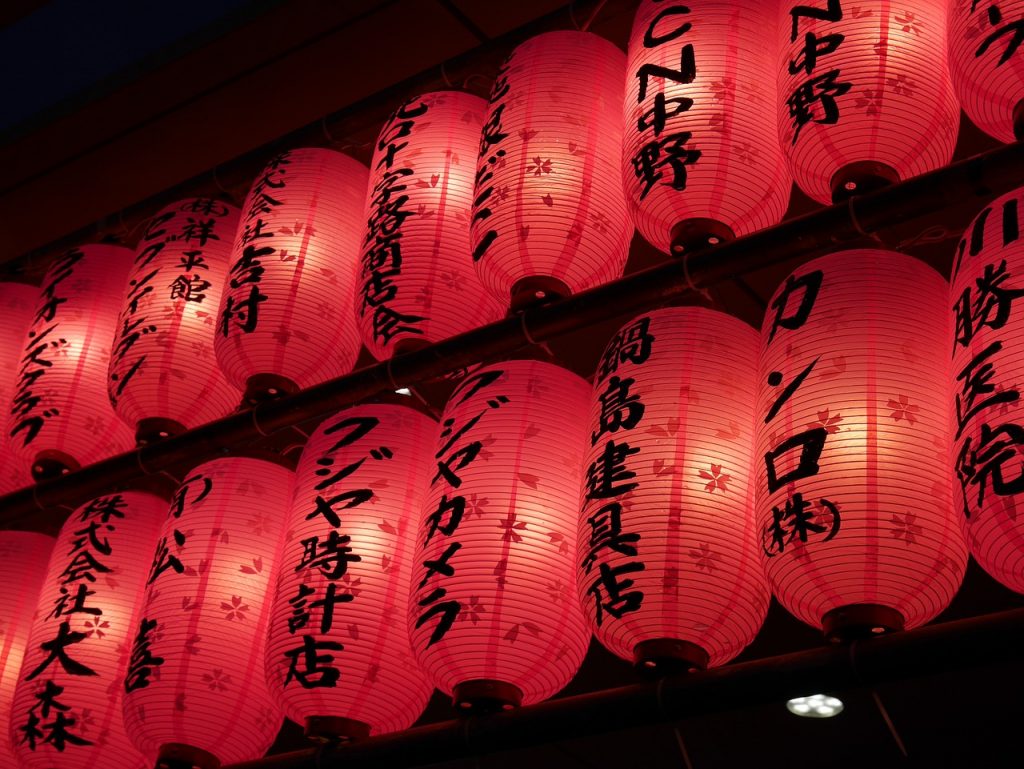
Chinese New Year 2017 – Year Of The Rooster
The Chinese New Year is celebrated on the first new moon of the year. Unlike the western New Year, Chinese New Year is celebrated on different dates each year. The festive period usually falls between the 21st Jan to the 20th Feb and the celebrations last for 15 days. This year the celebrations will begin on Saturday 28th  January 2017.
January 2017.
Mythology
According to tales and legends, the Chinese New Year traditions began with a mythical beast called Nian. It would visit around the New Year period and would attack the villagers, mainly targeting the children. One year an old man visited the village and decided to take action. He tried to convince the villagers to help him however they locked themselves away. They were sceptical of the stranger and his ideas. He then proceeded to hang up red paper and burned bamboo. The burning of bamboo created a crackling noise. That night Nian did not show up. So every year at New Year the villagers would copy what the old man did. Nian never came to the village again and the traditions continue into modern day. In Chinese, the word for New Year is Guo Nian and the literal translation of this is to overcome Nian.
Traditions
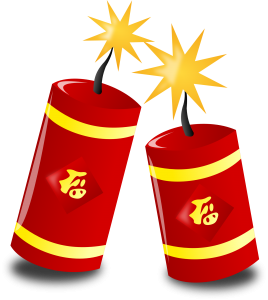 There are many traditions which the Chinese will take before and during the Chinese New Year. It is tradition to cleanse the house from top to bottom on the days leading up to the New Year celebrations. This symbolises the cleansing of any ill-fortune from the current year and preparing for any incoming good luck the New Year will bring. The house is then decorated with red items. Houses are mainly decorated with lanterns, red paper decorations and couplets (lines of poetry) written on red paper or carved onto wood. These will mainly be displayed around door frames. The couplets will usually express wishes of good luck for the upcoming year.
There are many traditions which the Chinese will take before and during the Chinese New Year. It is tradition to cleanse the house from top to bottom on the days leading up to the New Year celebrations. This symbolises the cleansing of any ill-fortune from the current year and preparing for any incoming good luck the New Year will bring. The house is then decorated with red items. Houses are mainly decorated with lanterns, red paper decorations and couplets (lines of poetry) written on red paper or carved onto wood. These will mainly be displayed around door frames. The couplets will usually express wishes of good luck for the upcoming year.
The New Year period is seen as a time for family. On New Year’s Eve, there is usually a family dinner called the reunion dinner. This dinner is a time for the family to reflect on the current year as well as being a good starting point for the New Year. To sound out the old year and bring in the new, firecrackers are lit. A string of small firecrackers is let off followed by three big ones. Accordingly, to tradition, it is lucky for businesses and farming if the bigger firecrackers are loud.
Most will then stay up late to watch the 4 and a half hour Chinese New Year gala on television. This will be watched into the early hours of New Year’s Day. After the initial celebrations, people will visit their families and the temple to pray and receive a year-long blessing. Another popular tradition is the gifting of red envelopes containing even amounts of money. These envelopes are given to children and sometimes the elderly. Working adults will not receive the envelopes with the occasional exception of receiving them from employers.
Superstitions
There are many superstitions attached to the Chinese New Year. On New Year’s Day, some people won’t do any cleaning around the house or any laundry. Some will even refuse to wash their hair. They believe they will be cleaning away any good luck. There are certain foods which need to be avoided at breakfast on New Year’s Day. The consumption of porridge apparently brings poverty and out of respect for the Buddhist Gods, no fish or meat should be at the breakfast table. It is bad luck for a married daughter to visit the house of her parents. The bad luck is given to the parents causing economic hardship for the family. Needle work or the use of knives and scissors should also be avoided on New Year’s Day, if you do so it will apparently lead to unpromising things and the depletion of wealth in the upcoming year.
Over the festive period, the superstitious will go to extremes to avoid bad luck. They believe that by doing the activities they will have an adverse effect on their luck. An example of this is you should avoid taking medicine or visiting the hospital as it is said to bring ill-health for the year. The more superstitious will go as far as breaking medicine containers after midnight to ensure they do not become ill in the upcoming year. It is also good to avoid lending or borrowing any money as this brings a yearlong debt. There are also numerous amounts of taboos attached to the New Year Period. A few examples of these are considered bad luck for a child to cry, to carry an odd amount of money and to break any dishes.
 Lucky food
Lucky food
Whilst The Chinese will avoid eating certain foods, they will eat specific foods to bring good luck during the festive period. Fish is a must at the dinner table. The fish is served whole with the head pointing towards the elders of the table. This is a sign of respect. No one else is allowed to eat unless they have started eating. The fish symbolises an increase in prosperity. Dumplings and spring rolls are eaten to bring wealth. The dumplings should be served in lines to bring maximum wealth and made with the most number of pleats possible. A junction too flat is meant to purport poverty. The pastry of the spring rolls symbolises wealth and prosperity due to the golden colour it becomes when they are fried.
It is also tradition to eat glutinous rice cakes to bring success and a family will eat sweet rice balls to symbolise togetherness. Another dish which is prepared is longevity noodles which unsurprisingly symbolise longevity. According to tradition, it is the length of the noodle which is meant to represent the eater’s life. As most people will wish for a long life it is more desired for the noodles to be as long as possible. The Chinese will also eat certain fruits during the New Year period. Tangerines, oranges and pomelos are eaten and displayed as a sign of fullness and wealth. These are selected in particular due to their round shape and because they are ‘golden’ in colour. All of these customs are taken lightheartedly.
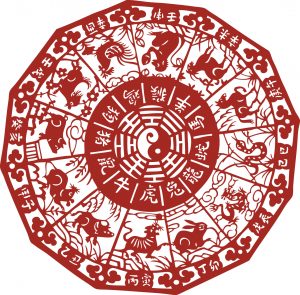 Year of the Rooster
Year of the Rooster
We are currently entering the year of the Rooster. This may sound odd to some, however, Chinese zodiac signs are represented by animals. These are completely different to the astrological zodiac signs the west are more familiar with. If you were born in the year 1909, 1921, 1933, 1945, 1957, 1969, 1981, 1993, 2005, 2017, then you are a Rooster. Just like regular zodiac signs Roosters are said to have specific personality traits. Whether you believe it or not it is quite interesting.
According to the Chinese zodiac, Roosters are described as being confident and intelligent. They are also said to be consistent, outgoing and skillful. They will be ambitious and successful in their careers, and will always be enthusiastic when given a new task. The determination and drive they show sometimes come across as being arrogant and they will often have a short fuse. With regards to love and romance, a rooster is said to be romantic and they are often found in happy and harmonious marriages. Roosters will apparently also go to great lengths to impress love interests especially when they believe they have found their soul mate.
Why not treat yourself or a loved one to a PAMP 5 gram or 1 ounce Lunar Rooster Gold bar or a Perth Mint Lunar Rooster Coin. These coins are currently available in ¼ ounce, 1 ounce or 2 ounce. The 1 ounce coins are also available in silver. All are available to order now.
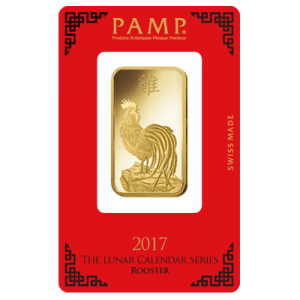
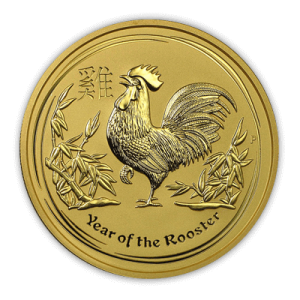
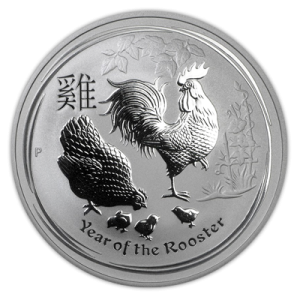

+ There are no comments
Add yours